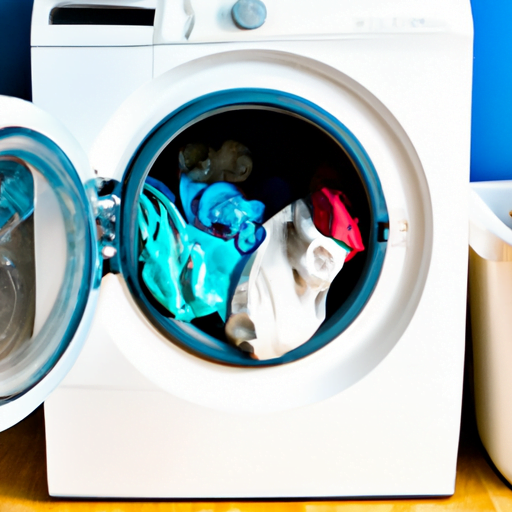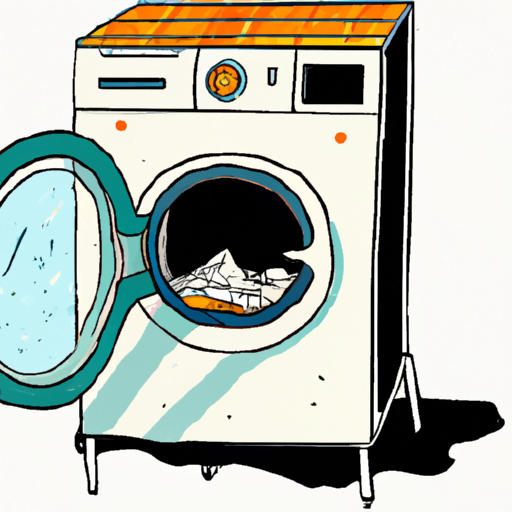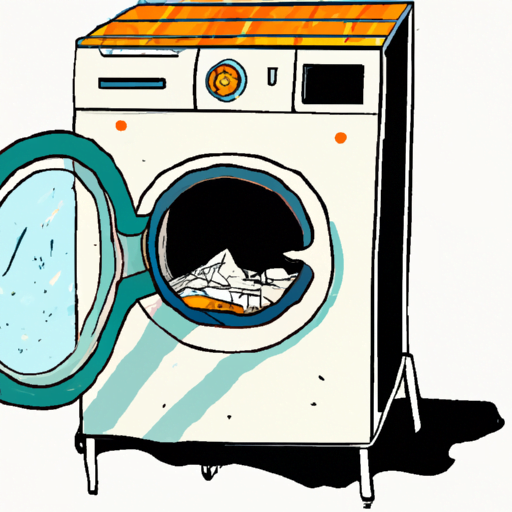So, you’ve decided to embrace off-grid living. Good for you! There’s something so satisfying about being self-sufficient and living in harmony with nature. But let’s get real for a moment – one of the challenges of living off-grid is figuring out how to do everyday tasks without relying on traditional appliances. And when it comes to doing laundry, things can get a bit tricky. I mean, who wants to wash clothes by hand all the time? But fear not, my friend, because today we’re going to explore some alternative washing machine options that will make your off-grid life a whole lot easier.
Now, you might be wondering if there’s a washing machine that runs without electricity. The answer is yes, and you’ll be pleasantly surprised by the variety of options available to you. From manual hand-cranked washers to portable foot-powered machines, there are plenty of alternatives to choose from. These machines operate on simple mechanical principles that require your physical effort instead of electricity. Not only are they eco-friendly, but they also give you a great workout!
In our upcoming article, we’ll delve deeper into these alternative washing machine options for off-grid living. We’ll discuss the pros and cons of each type, their functionality, and the estimated costs involved. So, whether you’re living completely off the grid or just looking for a more sustainable way to do your laundry, stay tuned! We’ve got you covered.

Understanding the Concept of Off-Grid Living
What is Off-Grid Living?
Off-grid living refers to a lifestyle in which individuals or households are self-sufficient and do not rely on public utilities, such as electricity, water, or gas. Instead, they generate their own power, collect and filter their own water, and use alternative methods for heating and cooling. This lifestyle is often chosen by those seeking to reduce their carbon footprint, live in remote areas, or simply be more self-reliant.
Advantages and Disadvantages of Off-Grid Living
Off-grid living offers several advantages. First and foremost, it allows individuals to be more environmentally friendly by reducing their reliance on fossil fuels and reducing their energy consumption. Additionally, off-grid living offers individuals a sense of independence and self-sufficiency. They are not at the mercy of utility companies or affected by power outages. However, there are also some disadvantages to off-grid living. It can be expensive to set up and maintain the necessary infrastructure, such as solar panels or wind turbines. Additionally, off-grid living requires individuals to be conscientious of their energy usage and make adjustments to their lifestyle.
Challenges of Off-Grid Living
While off-grid living has its benefits, it also presents challenges. One such challenge is the limited access to certain amenities, such as washing machines. Traditional washing machines require a considerable amount of electricity and water, making them impractical for off-grid living. However, there are alternative washing machine options available that cater to the specific needs of off-grid dwellers.
Exploring the Need for Alternative Washing Machine Options in Off-Grid Living
Why is a Washing Machine Essential in Off-Grid Living?
In any living situation, the need for clean clothing is evident. However, for off-grid residents, the task of doing laundry can be more challenging due to limited resources and energy constraints. Having a washing machine in off-grid living is essential not only for convenience but also for maintaining cleanliness and hygiene.
Limitations of Traditional Washing Machines in Off-Grid Living
Traditional washing machines are designed to be connected to a power source and rely on a constant supply of water. In off-grid living, these appliances can drain a significant amount of energy and put a strain on limited resources. Additionally, the need for a stable power source makes traditional washing machines impractical for those living off the grid.
Environmental Impact of Traditional Washing Machines
Apart from their high energy consumption, traditional washing machines also have environmental implications. They use a large amount of water, and the chemicals present in laundry detergents can be harmful when they end up in water bodies. The carbon emissions produced during the manufacturing and transportation processes of these machines also contribute to environmental pollution.
Innovative Washing Machine Options for Off-Grid Living
Hand-Powered Washing Machines
Hand-powered washing machines are a viable option for off-grid living. These machines are manually operated and do not require any electricity or water hookups. They typically consist of a drum or basin in which clothes are placed, along with a handle or crank that is turned to agitate the garments. Hand-powered washing machines are compact, lightweight, and easy to use. They are an excellent choice for those who value portability and are conscious of their energy consumption.
Foot-Powered Washing Machines
Similar to hand-powered washing machines, foot-powered washing machines require no electricity or water connections. These machines utilize a foot pedal mechanism that is stepped on to rotate the drum and agitate the clothes. Foot-powered washing machines are ideal for individuals who want a hands-free option and are willing to put in a little physical effort to get their laundry done.
Solar-Powered Washing Machines
For those living off the grid, solar-powered washing machines offer a sustainable and energy-efficient solution. These machines are equipped with solar panels that capture the sun’s energy and convert it into electricity to power the washing process. Solar-powered washing machines are eco-friendly, cost-effective, and do not rely on traditional power sources.
Gravity-Powered Washing Machines
Gravity-powered washing machines operate on the principle of using gravity to facilitate the washing process. These machines are designed with a drum that is placed at an elevated position. By filling the drum with water and adding detergent, the force of gravity allows the water to flow downwards, creating a gentle washing motion. Gravity-powered washing machines are a simple and low-tech option that requires minimal energy and resources.
Portable Washing Machines
Portable washing machines are versatile options that can be used both on and off the grid. These compact machines are lightweight and easy to transport, making them suitable for those living in small spaces or constantly on the move. Some portable washing machines are manually powered, while others may require a small amount of electricity. Overall, they provide a convenient and efficient way to do laundry without relying on traditional infrastructure.

Pros and Cons of Alternative Washing Machine Options
Advantages of Hand-Powered Washing Machines
Hand-powered washing machines offer several advantages. They require no electricity, water, or additional resources, making them highly sustainable and cost-effective. They also require minimal space and are easy to operate and maintain. In addition, these machines provide a good upper body workout while doing laundry.
Disadvantages of Hand-Powered Washing Machines
On the downside, hand-powered washing machines can be time-consuming and physically demanding. They require manual effort to agitate the clothes effectively, which can become tiring, especially for larger loads. Additionally, the washing capacity of hand-powered machines is often limited, meaning it may take longer to wash larger quantities of clothing.
Advantages of Foot-Powered Washing Machines
Foot-powered washing machines offer similar advantages to hand-powered machines. They are eco-friendly, cost-effective, and do not require electricity or water connections. The foot pedal mechanism allows for hands-free operation, which can be beneficial for multitasking or individuals with limited mobility.
Disadvantages of Foot-Powered Washing Machines
One disadvantage of foot-powered washing machines is that they still require physical effort to operate. While the foot pedal mechanism makes it easier to agitate clothes compared to hand-powered machines, it can still be tiring for extended periods. Additionally, foot-powered machines may have a smaller washing capacity, requiring multiple cycles for larger loads.
Advantages of Solar-Powered Washing Machines
Solar-powered washing machines offer the advantage of using renewable energy and reducing reliance on traditional power sources. They are environmentally friendly, cost-effective, and can be used even in remote off-grid locations. Solar-powered machines also often have larger washing capacities compared to hand or foot-powered options.
Disadvantages of Solar-Powered Washing Machines
One drawback of solar-powered washing machines is their reliance on sunlight. Cloudy or overcast weather may affect their performance, making them less efficient. Additionally, the initial setup cost of solar-powered machines can be higher compared to other options.
Advantages of Gravity-Powered Washing Machines
Gravity-powered washing machines are simple, energy-efficient, and require no external power source. They do not rely on electricity or water connections, making them ideal for off-grid living. Gravity-powered machines can be constructed at home using basic materials, making them a low-cost and customizable option.
Disadvantages of Gravity-Powered Washing Machines
The main disadvantage of gravity-powered washing machines is their limited washing capacity. The gentle washing motion created by gravity may not be as effective in cleaning heavily soiled or larger loads of clothing. Additionally, the construction of a gravity-powered machine may require some DIY skills.
Advantages of Portable Washing Machines
Portable washing machines offer the advantage of versatility and convenience. They can be used both on and off the grid, making them suitable for various living situations. Portable machines are lightweight, compact, and easy to transport, making them suitable for individuals who move frequently or have limited space.
Disadvantages of Portable Washing Machines
One disadvantage of portable washing machines is their smaller washing capacity. Due to their size, they may not be able to accommodate larger loads of laundry. Additionally, some models may require a small amount of electricity, which may not be feasible for those living completely off the grid.
Factors to Consider When Choosing an Alternative Washing Machine
Available Space and Portability
Consider the available space in your living area and the portability needs of the washing machine. If you have limited space or frequently move, a compact and lightweight option like a portable washing machine may be more suitable.
Power Requirements
Evaluate the power requirements of the alternative washing machines you are considering. If you’re looking for a machine that operates completely off the grid, opt for manually-powered or solar-powered options. However, if you have access to a small amount of electricity, a portable machine that requires minimal power may also be a viable choice.
Washing Capacity and Efficiency
Consider the load capacity and washing efficiency of the alternative washing machines. If you frequently wash large loads of laundry, a machine with a larger capacity may be more practical. Additionally, evaluate the washing efficiency of each option to ensure your clothes are properly cleaned.
Durability and Maintenance
Look for alternative washing machines that are durable and require minimal maintenance. Off-grid living often means limited access to repair services, so choosing a machine that is built to last and easy to maintain will save you time, money, and frustration in the long run.
Cost and Affordability
Evaluate the cost and affordability of the alternative washing machines. While off-grid living often involves upfront costs, it’s essential to choose a machine that fits within your budget. Consider both the initial investment and any ongoing costs associated with the machine, such as detergent or replacement parts.
Installation and Operation Guidelines for Alternative Washing Machines
Step-By-Step Installation Process
The installation process may vary depending on the type of alternative washing machine chosen. Refer to the manufacturer’s instructions for specific installation guidelines. In general, ensure the machine is placed on a stable surface, connect any necessary hoses or power cords, and ensure the machine is properly secured to prevent tipping or movement during operation.
Operating Instructions and Tips
Refer to the manufacturer’s operating instructions for detailed guidelines on using the alternative washing machine. Follow any recommended steps for loading clothes, adding detergent, and selecting the appropriate wash settings. Additionally, it may be helpful to consult online resources or user forums for tips and tricks specific to the machine you choose.
Maintenance and Troubleshooting
Regular maintenance is essential to keep your alternative washing machine running smoothly. Follow any maintenance guidelines provided by the manufacturer, such as cleaning filters or replacing worn-out parts. In case of any issues or malfunctions, consult the troubleshooting section of the machine’s manual or contact the manufacturer for assistance.
Comparative Analysis of Alternative Washing Machine Brands
Brand 1: Features, Pros, and Cons
Brand 1 offers an alternative washing machine that is manually operated. It features a compact design, making it suitable for small spaces. The machine has a moderate load capacity and is relatively easy to use. However, some users have reported that the machine requires more effort to operate and may not be as effective in cleaning heavily soiled clothes.
Brand 2: Features, Pros, and Cons
Brand 2 offers a solar-powered washing machine that provides an environmentally friendly and energy-efficient solution for off-grid living. The machine has a larger load capacity and is designed to be durable and low-maintenance. However, the initial setup cost may be higher compared to other options, and its performance may be affected by cloudy weather conditions.
Brand 3: Features, Pros, and Cons
Brand 3 specializes in portable washing machines that can be powered by a small amount of electricity or manually operated. These machines are lightweight, compact, and easy to transport. They offer a reasonable load capacity and are designed for durability. However, some users have reported limited washing efficiency compared to larger machines.
Real-Life Experiences and Testimonials from Off-Grid Users
User 1: Journey and Feedback
User 1 has been living off the grid for five years and uses a hand-powered washing machine. They appreciate the sustainability and cost-effectiveness of their machine but note that larger loads can be time-consuming to wash. Overall, User 1 is satisfied with their alternative washing machine and finds it suits their off-grid lifestyle well.
User 2: Journey and Feedback
User 2 has recently transitioned to off-grid living and opted for a solar-powered washing machine. They praise the machine for its energy efficiency and the convenience of not relying on a power source. User 2 finds the washing capacity suitable for their needs and appreciates the reduced environmental impact of their choice.
User 3: Journey and Feedback
User 3 researched various alternative washing machine options and settled on a foot-powered washing machine. They enjoy the hands-free operation and find that the machine agitates clothes effectively. However, User 3 notes that larger loads require multiple cycles, and physical effort is still necessary for optimal results.
Exploring Additional Eco-Friendly Laundry Practices in Off-Grid Living
Dryer Alternatives: Air Drying, Line Drying, etc.
In off-grid living, utilizing natural drying methods is a cost-effective and eco-friendly alternative to traditional electric dryers. Consider air drying clothes indoors or outdoors, using a clothesline, or utilizing drying racks. These methods are not only energy-efficient but also help preserve clothing and reduce wear and tear.
Laundry Detergent Alternatives: Natural and Homemade Options
Off-grid living provides an opportunity to explore natural and homemade laundry detergent alternatives. Consider using soap nuts, which are natural berries that release saponin when in contact with water, acting as a gentle and eco-friendly laundry detergent. Additionally, homemade options, such as a mixture of baking soda and vinegar, can effectively clean clothes without harmful chemicals.
Water Conservation and Recycling
Conserving water is crucial in off-grid living. Implement practices such as reusing greywater from laundry and other household chores for non-potable purposes, such as gardening or flushing toilets. Additionally, installing water-saving fixtures, such as low-flow showerheads or faucet aerators, can further reduce water consumption.
Conclusion
Off-grid living offers individuals the opportunity to live sustainably and independently. While traditional washing machines may not be suitable for off-grid environments, alternative washing machine options provide practical and environmentally friendly solutions. Hand-powered, foot-powered, solar-powered, gravity-powered, and portable washing machines cater to the diverse needs of off-grid dwellers. By considering factors such as space, power requirements, washing capacity, durability, and cost, individuals can make an informed decision when choosing an alternative washing machine. Supplementing laundry practices with eco-friendly methods, such as air drying and using natural or homemade detergents, further enhances the sustainability of off-grid living. With the right combination of alternative washing machine options and eco-friendly laundry practices, off-grid residents can enjoy clean clothes while minimizing their environmental impact.




